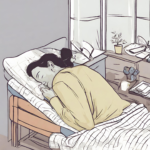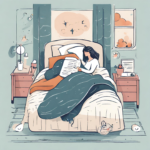In our fast-paced world, the phenomenon of sleep deprivation has insidiously crept into the lives of many. Often overshadowed by the hustle and bustle of daily responsibilities, the lack of adequate sleep can stealthily inflict a myriad of health and cognitive impairments. However, nestled within the realm of our daily routines lies a potent, yet frequently overlooked ally – napping. This comprehensive exploration delves into the intricacies of sleep deprivation and elucidates how the strategic embrace of napping can significantly ameliorate its detrimental effects.
Understanding Sleep Deprivation
Sleep deprivation arises when an individual consistently receives less sleep than their body requires to function optimally. The threshold for sleep deprivation varies across demographics, with children, adolescents, and young adults being particularly susceptible, while older adults might display a higher tolerance.
The Far-reaching Impacts of Inadequate Sleep
Chronic sleep deprivation can insidiously erode one’s health and well-being. It can:
- Impair Cognitive Function: Sleep is pivotal for cognitive consolidation. Deprivation hinders concentration, problem-solving abilities, and the capacity to make informed decisions.
- Disrupt Emotional Equilibrium: Inadequate sleep can precipitate mood fluctuations, irritability, and amplify the risk of developing depressive disorders.
- Compromise Immune Proficiency: Persistently poor sleep can debilitate immune defenses, heightening vulnerability to infections.
- Elevate Chronic Disease Risk: Prolonged sleep deprivation is associated with heightened risks of obesity, diabetes, and cardiovascular diseases.
- Diminish Physical Performance: A lack of sleep can lead to decreased energy levels, reduced physical strength, and slower reaction times, impacting overall physical performance and coordination.
The Restorative Power of Naps
Naps are not exclusively beneficial for the young. Research robustly underscores the multifaceted benefits that naps confer upon adults. Here’s how naps can help palliate the negative sequelae of sleep deprivation:
Cognitive Rejuvenation
Naps act as a cerebral refresh button, markedly enhancing alertness, sharpening attention, and bolstering learning and problem-solving capacities. They provide a cognitive second wind, equipping individuals to tackle daily challenges more effectively.
Emotional Stability
Napping has been demonstrated to foster mood regulation and diminish sensations of irritability or frustration. A brief interlude of rest can infuse a sense of relaxation and mitigate stress, serving as an emotional balancer, especially on days beleaguered by sleep deprivation.
Immune System Fortification
A succinct nap can invigorate the immune system. Napping has been correlated with increased production of cytokines, proteins essential in combating inflammation and infection.
Mitigating Chronic Disease Risk
Regular napping can aid in regulating hormones and attenuating stress, which in turn can abate the risks of chronic diseases associated with sleep deprivation, such as heart disease and diabetes.
Optimizing Naps for Maximum Benefit
To extract the quintessence of napping, consider the timing, setting, and duration:
- Timing: Aligning naps with the natural circadian dip in alertness, typically early to mid-afternoon, is optimal.
- Environment: A tranquil, dim, and comfortable environment is conducive to swiftly achieving restorative sleep.
- Duration: Limit naps to 20-30 minutes to circumvent sleep inertia and nocturnal sleep disruptions.
Special Considerations
Although napping offers a panacea of benefits, it isn’t universally applicable. Individuals grappling with insomnia or those with compromised nighttime sleep quality should exercise caution, as napping could exacerbate their sleep disturbances. Personalize your napping practices to harmonize with your unique health prerequisites and lifestyle.
Napping in Different Life Stages and Situations
For Students and Professionals
Short naps can be particularly beneficial for students and working professionals. A brief nap after learning can help with memory consolidation, making it easier to recall information later. For professionals, a nap can help overcome the post-lunch dip in energy levels, improving productivity and focus for the rest of the day.
For Athletes
Athletes may find napping particularly beneficial. Adequate rest is crucial for physical recovery and performance. A nap can provide an extra boost of energy and can aid in muscle repair, especially after intense training sessions.
For Parents and Caregivers
Parents, especially those with newborns, and caregivers often experience disrupted sleep patterns. Napping when the opportunity arises can help reduce sleep debt, maintain alertness, and improve mood.
Napping Etiquette and Tips
To make the most out of your napping experience, consider the following tips:
- Communicate: If you’re at work or in a shared space, inform others of your intention to nap to minimize interruptions.
- Set an Alarm: To avoid oversleeping, set an alarm for the desired nap duration.
- Create a Routine: Try to nap at the same time each day to establish a routine that your body can adapt to.
- Consider a “Nap Kit”: Keep a nap kit handy, which might include items like an eye mask, earplugs, and a small blanket.
- Stay Hydrated: Drinking water before and after your nap can help you feel more refreshed.
Final Thoughts
In conclusion, while sleep deprivation is an insidious contemporary issue, it need not dominate your life. By judiciously incorporating naps into your routine, you can counteract many of the negative effects of sleep deprivation. Consider naps as your clandestine arsenal in the pursuit of enhanced health and well-being. When sleep deprivation’s grip tightens, setting aside time for a rejuvenating nap could be the most benevolent act for your body and mind.


